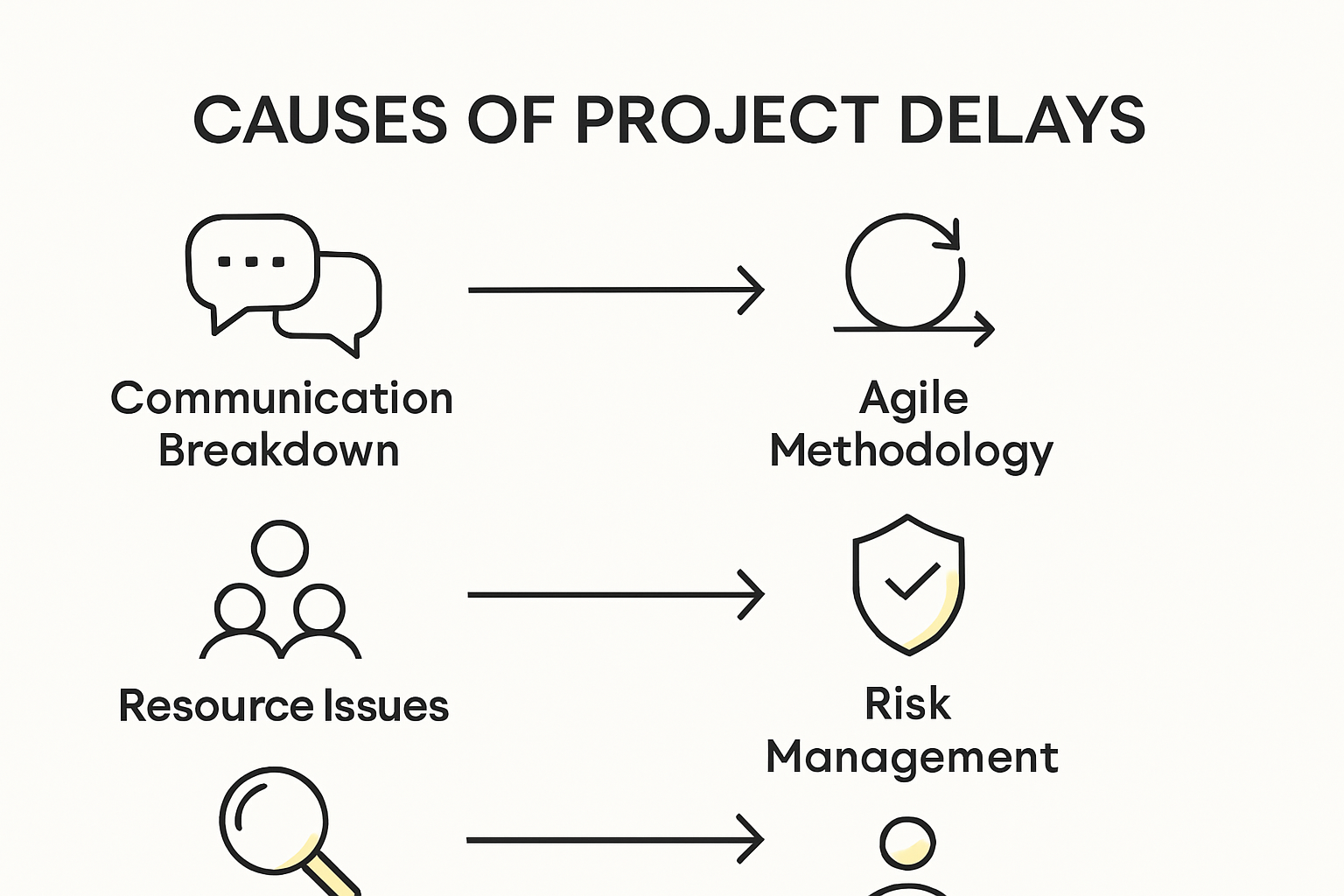Project delays can swallow up budgets, wear down teams, and put entire business goals at risk. Experts say that ineffective communication alone causes nearly one in three project failures worldwide. It sounds like missed deadlines are inevitable, right? Not so fast. New strategies for 2025 are changing the playbook, turning chronic project setbacks into rare exceptions that are easier than ever to avoid.
Table of Contents
- Understanding the Root Causes of Project Delays
- Proven Strategies to Overcome Delays
- Building a Culture of Timely Project Delivery
- Tools and Techniques for Faster Project Completion
Quick Summary
| Takeaway | Explanation |
|---|---|
| Enhance communication to prevent delays | Clear, consistent communication minimizes misalignment and misunderstandings among team members and stakeholders. |
| Utilize agile methodologies for flexibility | Agile approaches break projects into smaller parts, allowing for quick adaptations and timely updates throughout the project lifecycle. |
| Engage stakeholders systematically | Continuous stakeholder engagement ensures all participants are aligned, reducing the chance of miscommunication and project overruns. |
| Implement performance measurement tools | Techniques like Earned Value Management allow managers to track project performance and identify potential issues before they escalate. |
| Cultivate a culture of accountability | Establishing clear responsibilities and recognition for on-time delivery encourages teams to prioritize project timelines effectively. |
Understanding the Root Causes of Project Delays
Project delays can derail even the most well-intentioned initiatives, causing significant financial and operational challenges for organizations. Understanding the root causes of these delays is crucial for developing effective prevention and mitigation strategies.
Complex Organizational Dynamics and Communication Breakdowns
One of the primary drivers of project delays stems from complex organizational dynamics and communication breakdowns. Research from the Project Management Institute reveals that ineffective communication and misaligned stakeholder expectations are fundamental contributors to project setbacks. Teams often struggle with unclear project objectives, fragmented communication channels, and inconsistent information sharing.
These communication challenges manifest in several critical ways. Stakeholders might have divergent interpretations of project goals, leading to misaligned efforts and wasted resources. Miscommunication can result in redundant work, conflicting priorities, and significant time spent resolving unnecessary conflicts. Project managers must establish robust communication protocols that ensure transparency, clarity, and consistent information flow across all team levels.
Resource Allocation and Risk Management Challenges
Ineffective resource allocation represents another significant factor in project delays. The U.S. Government Accountability Office report highlights how inadequate resource planning and poor risk management can dramatically extend project timelines. Organizations frequently underestimate the complexity of resource requirements, leading to bottlenecks, skill gaps, and unexpected constraints.
Risk management plays a pivotal role in preventing delays. Many projects fail to conduct comprehensive risk assessments, leaving them vulnerable to unforeseen challenges. This reactive approach means teams spend more time addressing emergent issues rather than proactively preventing them. Successful project management requires a systematic approach to identifying potential risks, developing mitigation strategies, and maintaining flexible resource allocation models.
Scope Creep and Shifting Priorities
Scope creep represents a persistent challenge in project management, often transforming manageable initiatives into unwieldy, delayed endeavors. Stakeholders introduce incremental changes that gradually expand project boundaries, consuming additional time and resources. These modifications might seem minor individually but can accumulate into substantial timeline extensions.
Organizations must implement rigorous change management processes that carefully evaluate proposed modifications. This involves establishing clear project parameters, creating structured approval mechanisms for scope adjustments, and maintaining disciplined documentation of all proposed changes. By creating a systematic approach to managing project scope, teams can minimize unexpected delays and maintain project momentum.
Effective project management demands a holistic understanding of these root causes. Recognizing the interconnected nature of communication breakdowns, resource challenges, and scope management enables organizations to develop more resilient project strategies. Check out our guide on advanced project tracking methods to learn more about preventing these common pitfalls and maintaining project efficiency.
To help clarify the primary causes of project delays discussed above, the following table summarizes each core issue and its typical impact on project timelines.
| Root Cause | Description | Typical Impact |
|---|---|---|
| Communication Breakdowns | Unclear objectives, misaligned expectations, poor information flow | Misalignment, redundant work, delays |
| Resource Allocation Issues | Inadequate planning, underestimated requirements, skill gaps and bottlenecks | Bottlenecks, schedule overruns |
| Poor Risk Management | Lack of proactive risk identification and mitigation strategies | Emergencies, timeline extensions |
| Scope Creep | Incremental or unapproved project changes expand project boundaries | Additional work, expanded timelines |
| Shifting Priorities | Changing organizational priorities or stakeholder goals during project execution | Disruptions, rescheduling, slowdowns |
Proven Strategies to Overcome Delays

Overcoming project delays requires a strategic and proactive approach that addresses the root causes identified in previous discussions. By implementing targeted strategies, organizations can significantly reduce the risk of timeline extensions and improve overall project performance.
Agile Methodology and Adaptive Project Management
Research from the Project Management Institute highlights the transformative power of agile methodologies in managing project timelines. This approach breaks down complex projects into smaller, manageable segments, allowing teams to adapt quickly and maintain momentum. By implementing daily stand-up meetings, sprint planning, and continuous feedback loops, organizations can create a more responsive project management framework.
Agile methodologies enable teams to identify and address potential delays in real-time. This approach involves breaking project scopes into smaller, tangible parts that can be closely monitored and adjusted as needed. Teams can utilize dynamic dashboards to track deliverable states, ensuring transparency and allowing for immediate interventions when challenges arise.
Advanced Technology and AI-Driven Project Management
Cutting-edge research on AI in project management reveals remarkable potential for addressing project delays through technological innovation. Artificial Intelligence offers powerful tools for automating repetitive tasks, providing predictive analytics, and generating actionable recommendations. By integrating AI-driven solutions, organizations can significantly enhance their project management capabilities.
AI technologies can assist in multiple critical areas. Predictive analytics help teams identify potential risks before they become significant obstacles. Automated task management reduces human error and streamlines workflow processes. Machine learning algorithms can analyze historical project data to provide more accurate timeline estimations and resource allocation strategies.
Comprehensive Stakeholder Engagement and Communication
A groundbreaking study on stakeholder management emphasizes the critical importance of systematic stakeholder engagement in preventing project delays. Organizations must develop a structured approach to identifying, categorizing, and continuously communicating with all project stakeholders. This involves creating detailed stakeholder maps that classify participants by their influence and interest levels.
Effective stakeholder management requires establishing clear communication channels and implementing regular feedback mechanisms. This approach ensures that all project participants have a shared understanding of objectives, potential challenges, and expected outcomes. By maintaining transparent and consistent communication, teams can proactively address potential issues before they escalate into significant delays.
Successful project management in 2025 demands a holistic approach that combines technological innovation, adaptive methodologies, and strategic communication. Learn more about our advanced project tracking techniques to transform your approach to project delivery and minimize potential delays. By implementing these proven strategies, organizations can create more resilient, efficient, and successful project management processes.
To distinguish the key strategies discussed above, the table below compares their primary features and benefits for overcoming project delays.
| Strategy | Key Features | Main Benefits |
|---|---|---|
| Agile Methodology & Adaptive Management | Sprints, stand-ups, continuous feedback | Flexibility, faster adaptation |
| Advanced Tech & AI-Driven Project Management | Automation, predictive analytics, machine learning | Early risk detection, efficiency gains |
| Stakeholder Engagement & Communication | Stakeholder mapping, feedback loops, transparency | Alignment, issue prevention |
Building a Culture of Timely Project Delivery
Creating a culture of timely project delivery requires more than implementing strategic tools and methodologies. It demands a comprehensive organizational transformation that prioritizes punctuality, accountability, and proactive problem-solving across all operational levels.
Leadership and Accountability Framework
Research from the Association for the Advancement of Cost Engineering International highlights the critical role of senior management in developing a schedule-oriented organizational culture. Leaders must actively demonstrate and reinforce the importance of timely project completion by embedding schedule considerations into every project discussion and decision-making process.
This approach involves creating a transparent accountability framework where team members understand their individual and collective responsibilities. Performance metrics should directly link to project timeline adherence, encouraging a proactive mindset toward meeting deadlines. By establishing clear expectations and recognizing teams that consistently deliver projects on time, organizations can motivate employees to prioritize efficiency and punctuality.
Communication and Transparency Protocols
Construction industry analysis underscores the paramount importance of clear and continuous communication in maintaining project timelines. Organizations must establish robust communication channels that facilitate rapid information sharing, problem identification, and collaborative solution development.
Effective communication protocols involve implementing regular status update meetings, creating standardized reporting templates, and utilizing collaborative technologies that enable real-time tracking and transparent reporting. These mechanisms ensure that potential delays are identified and addressed quickly, preventing minor issues from escalating into significant timeline disruptions. Teams should be encouraged to communicate challenges openly and proactively, without fear of negative repercussions.
Continuous Learning and Adaptive Strategies
A groundbreaking stakeholder management study emphasizes the importance of creating an organizational culture that views project delays as learning opportunities rather than failures. This involves developing comprehensive post-project review processes that systematically analyze timeline challenges, identify root causes, and develop preventative strategies for future initiatives.
Organizations should invest in continuous professional development programs that enhance team members’ project management skills, time management capabilities, and adaptability. This might include workshops on advanced scheduling techniques, training in emerging project management technologies, and creating mentorship programs that allow experienced professionals to share insights with emerging team members.
Explore our comprehensive guide to effective task management to gain deeper insights into building a culture of timely project delivery. By implementing these strategic approaches, organizations can transform their project management practices, creating an environment that naturally prioritizes efficiency, accountability, and continuous improvement.
Tools and Techniques for Faster Project Completion
Accelerating project completion requires strategic utilization of advanced management techniques and innovative tools that enable teams to optimize workflows, predict potential challenges, and streamline project execution.
Advanced Project Management Methodologies
The Critical Chain Project Management technique represents a sophisticated approach to reducing project timelines by focusing on resource constraints and strategic buffer management. This methodology shifts traditional project management perspectives by prioritizing resource availability and flexibility over rigid scheduling constraints.
Critical Chain Project Management introduces innovative concepts like task buffers and resource buffers that provide strategic flexibility. By identifying and managing potential bottlenecks proactively, teams can create more realistic project timelines and allocate resources more effectively. This approach recognizes that traditional linear scheduling often fails to account for the complex interdependencies and human factors that influence project progress.
Performance Measurement and Tracking Techniques
Earned Value Management (EVM) provides a powerful framework for objectively measuring project performance and identifying potential delays before they become critical. This technique integrates scope, time, and cost parameters to create a comprehensive performance assessment mechanism that allows project managers to make data-driven decisions.
By comparing planned work against completed work and actual expenditures, EVM generates precise metrics that reveal project health in real-time. Teams can quickly identify variances, understand their root causes, and implement corrective actions. The approach transforms project tracking from a reactive process to a proactive management strategy, enabling more precise forecasting and resource allocation.
Statistical Planning and Optimization Strategies
The Program Evaluation and Review Technique (PERT) offers a sophisticated statistical approach to project planning and scheduling. This method enables project managers to analyze task sequences, estimate realistic completion times, and identify the most efficient path to project completion.
PERT introduces probabilistic time estimates that account for uncertainties inherent in complex projects. By calculating optimistic, pessimistic, and most likely durations for each task, teams can develop more resilient project plans. This approach is particularly valuable in environments with high uncertainty or innovative projects where traditional deterministic scheduling methods fall short.

Explore our comprehensive project tracking strategies to discover how these advanced techniques can transform your project management approach. By integrating these sophisticated tools and methodologies, organizations can create more agile, responsive, and efficient project delivery systems that consistently meet or exceed timeline expectations.
Frequently Asked Questions
What are the main causes of project delays?
Project delays can typically be attributed to communication breakdowns, resource allocation issues, poor risk management, scope creep, and shifting priorities.
How can agile methodologies help prevent project delays?
Agile methodologies help prevent delays by breaking projects into smaller, manageable segments, allowing teams to adapt quickly and monitor progress in real-time.
What role does technology play in overcoming project delays?
Advanced technology, particularly AI-driven project management tools, enhances efficiency by automating tasks, providing predictive analytics, and improving resource allocation strategies.
How can organizations build a culture of timely project delivery?
Organizations can cultivate a culture of timely project delivery by establishing clear accountability frameworks, enhancing communication protocols, and promoting continuous learning through professional development.
Transform Project Setbacks Into Success With Gammatica
Tired of watching deadlines slip away and teams struggle with miscommunication, resource confusion, or scope creep? This article showed that modern projects depend on clarity, automation, and proactive management to avoid common traps like bottlenecks and fragmented communication. Stress and lost productivity come when you lack advanced tools for real-time tracking, efficient task allocation, and stakeholder alignment.

Now is the time to turn proven strategies into real-world results. Gammatica’s AI-powered project management platform gives you everything you need for agile delivery, streamlined collaboration, and automated workflow tracking. Free up as much as 16 hours a week and ensure transparency through Kanban boards, checklists, and CRM integration. Explore how Gammatica can help your team stay adaptable, organized, and always on schedule. Start transforming your next project today and experience the new standard for successful, on-time delivery.
Recommended
- Project Progress Tracking: Strategies for Success in 2025 | Gammatica
- How to Manage Tasks Effectively in 2025: Proven Strategies for Leaders | Gammatica
- Collaborative Decision Making for Leaders: Strategies for 2025 | Gammatica
- Automation for Small Businesses: Essential Strategies for 2025 | Gammatica



